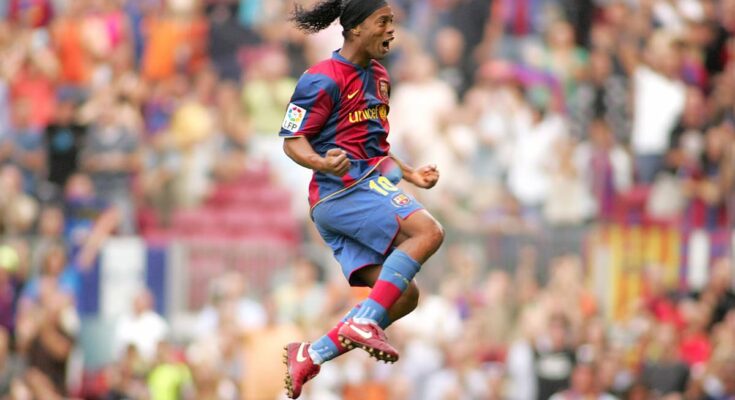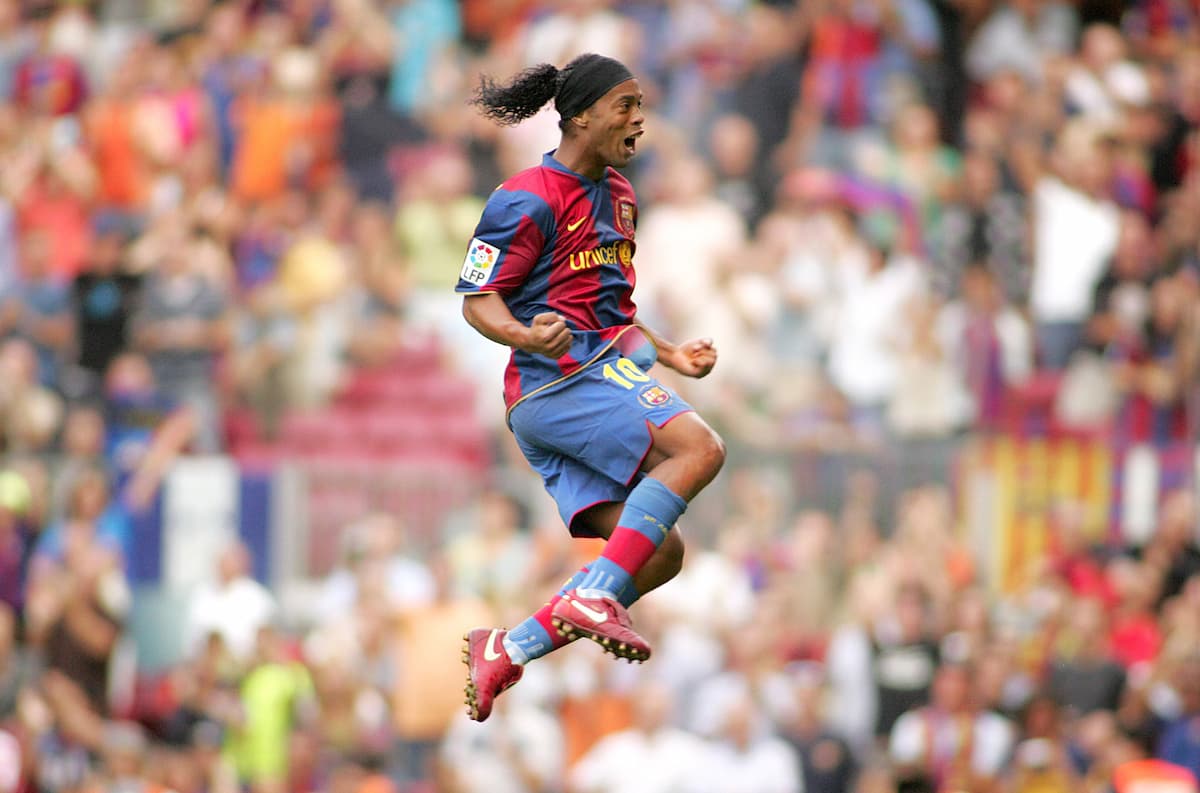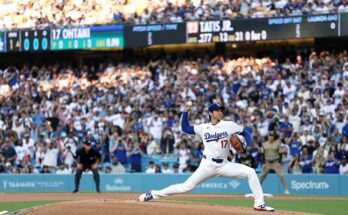In a sport so often defined by results and statistics, Ronaldinho was the glorious exception, the magician who made football joyful again. With a toothy grin, dancing feet and a street ball swagger, he didn’t just play the game – he performed it.
His rise from the favelas of Porto Alegre to the grand stages of Paris and Barcelona is more than just a footballing journey. It’s the story of a kid who brought samba to the world stage and reminded us all why we fell in love with the beautiful game.
Born With The Ball: Porto Alegre Roots
Born Ronaldo de Assis Moreira in 1980, in the southern Brazilian city of Porto Alegre, Ronaldinho was immersed in football from an early age. His father, João, was a shipyard worker and a player for the local club Esporte Clube Cruzeiro.
Tragically, when Ronaldo was just eight years old, his father died when he hit his head in the swimming pool at their new home and drowned, a moment in his life that left an emotional scar but also deepened his bond with the game.
Nicknamed “Ronaldinho” – meaning “little Ronaldo”- as he was often the smallest player during his youth player days on the national stage, it also distinguished him from the older Ronaldo Nazário. His flair and balance were not honed on grass pitches but on the Futsal courts and sand pitches, where space was tight and improvisation was everything.
At just 13, he scored 23 goals in a single youth match, a performance that caught the attention of Grêmio, Porto Alegre’s top club. By 18, he was dazzling fans with a signature mix of stepovers and no-look passes. At Grêmio, he won the 1999 Copa Sul and the 1999 Campeonato Gaúcho.
Parisian Playground: Ronaldinho At PSG
Ronaldinho’s rise quickly attracted European attention, and in 2001, he joined Paris Saint-Germain for a fee of €5 million. In France, he clashed with manager Luis Fernandez, who was frustrated by his nightlife habits and inconsistent training. Yet on the pitch, he delivered flashes of brilliance. His trademark smile was matched by moments of audacity – none more memorable for PSG than his dinked finish against Guingamp in 2003.
The previous year at the 2002 World Cup, he also famously chipped David Seaman from a free kick in Brazil’s quarter-final victory over England. This goal defined his fearless creativity. Although his time in Paris was rocky, it served as a crucial launching pad. By 2003, the biggest clubs in Europe were circling. Manchester United thought they had signed him, until Barcelona swooped in.
Wearing The Yellow Shirt: Ronaldinho And The Seleção
Ronaldinho made his Brazil debut in 1999, winning the Copa América, and just three years later, he was a World Cup winner—part of the legendary 2002 attack alongside Ronaldo and Rivaldo. He later won the 2005 Confederations Cup and played in the 2006 World Cup, though Brazil fell short in the quarter finals, losing 1-0 to France.
He captianed Brazil at the 2008 Olympics and won a bronze medal. Ronaldinho finished his international career with 97 caps and 33 goals, remembered not just for the silverware but for the joy and flair that he brought everytime he wore the iconic yellow shirt.
The Barcelona Renaissance
Ronaldinho joined Barcelona in the summer of 2003, a club then in financial and institutional disarray. But his arrival changed everything. In his debut season, he lifted them from a disappointing 6th-place finish to runners-up. With each Elastico, no-look pass, and gravity-defying run, he reawakened Camp Nou’s spirit.
In the following years, he reached his peak. Ronaldinho led Barcelona to back-to-back La Liga titles (2004/05 & 2005/06), back-to-back Spanish Super Cups in those same years and the 2006 Champions League. He was named FIFA World Player of the Year twice (2004 & 2005) and won the Ballon d’Or in 2005. He made football fun again – not just for Barcelona fans, but for neutrals across the world. Opponents couldn’t help but smile even if they were left in his wake.
Brand, Joy, And Global Influence
Ronaldinho wasn’t just a footballer; he became a global icon. He was the face of Nike’s Joga Bonito campaign, a movement that encouraged creativity, respect and passion in football. The videos of him juggling and hitting the crossbar with ease are still considered one of the best TV campaigns of all time.
On the pitch, he inspired a new generation. Lionel Messi has often spoken of the positive influence that Ronaldinho had on him and has described him as a mentor. Also, Neymar, Matheus Cunha, Vinicius Jr and countless other Brazilian footballers have cited Ronaldinho as their idol. His fusion of futsal skills, playground tricks, and elite footballing intelligence proved that you didn’t need to sacrifice expression for success.
But perhaps his greatest legacy was emotional; he brought joy to millions, not by chasing stats, but by embracing the beauty of the game.
The Twilight Years And The Final Flourish
By 2008, the toll of injuries and a lavish lifestyle began to show. He left Barcelona in 2008 for AC Milan, where he won Serie A in the 2010/11 season but never truly rekindled the fire, with manager Carlo Ancelotti critical of his physical condition. Later spells at Flamingo, Atlético Mineiro, and Querétaro followed. Yet even in his twilight, his magic remained. In 2013, he helped Atlético Mineiro to win the Copa Libertadores, South America’s biggest club competition, a poetic high note for a player accused of fading too soon
Off the pitch, he experienced turbulence. In 2020, The Guardian reported that he was arrested in Paraguay for using a fake passport and spent 32 days in a maximum security prison. Still, his reputation remained strangely intact as the world saw not a fallen star, but a beloved trickster caught in the wrong place. Now, Ronaldinho works as an ambassador for various charitable causes and continues to appear at charity matches, where his every touch still draws applause.
The Smile That Endures
Ronaldinho may never top the rankings in the Messi-Ronaldo statistical era, and he may not of won as many trophies as some of his peers, but that was never the point. He played the game like it was still the one from his childhood: style over statistics.
In a time where football is increasingly scrutinised, Ronaldinho remains a symbol of freedom. He didn’t just win matches, but also hearts; he didn’t just play football, he celebrated it. And for that, the world will always smile back.
Source link




